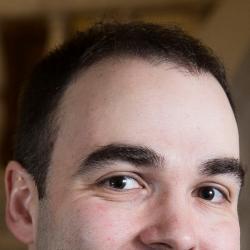Biography
Dr Ben Hall is a computational biologist in the MRC Cancer Unit. He leads a program on “Modelling the decision processes of cancer”, where his team develop computational models of the earliest stages of cancer progression, with a particular focus on the use of executable models and formal verification. He holds a Royal Society University Research Fellowship, and work in his group is funded by the MRC, Microsoft Research, and the Royal Society.
Prior to his current position he worked with Dr Jasmin Fisher at Microsoft, constructing executable models of organ development in C. elegans and developing tools for formal verification in biology. He continues to collaborate with Dr Fisher in the ongoing development and maintenance of the BioModelAnalyzer. He completed his DPhil and previous post-doctoral positions in molecular modelling at Oxford and UCL.
Research Profile
Modelling the Decision Making Processes of Cancer
There are ~37 000 000 000 000 cells in the adult human body, yet only 1 in 2 adults develop cancers in their lifetime. When you consider the number of opportunities cells in the body have to develop into cancer, the chances of any single cell becoming a cancer are incredibly small. My research uses the same advanced computational techniques which are used to find software bugs in order to understand how the series of errors can occur that eventually lead to cancer development.
To find bugs which rarely occur, computer scientists convert complex software into a simplified form. These computational representations can then be tested to ask broad questions such as- "does this behavior ever happen?" or "do all calculations end with the same result?". I use the same techniques and concepts to address problems in cancer biology. By using a simplified representation of cell communication and decision making processes, I can show how mutations change the cell, and show why some orders are dangerous whilst others are not.
This work could lead to unique insights into cancer evolution, and by testing new ideas with simulation, may enrich the experimental programmes of collaborators. It can also identify new problems in computer science, thereby driving the discovery of algorithms required to solve them. My group also maintains a long standing interest in model systems, specifically C. elegans development and bacterial signalling, and has recently been thinking about the broad issue of reproducibility in computational sciences.
Research Group Links
https://www.mrc-cu.cam.ac.uk/research/benjamin-hall-folder/biography

